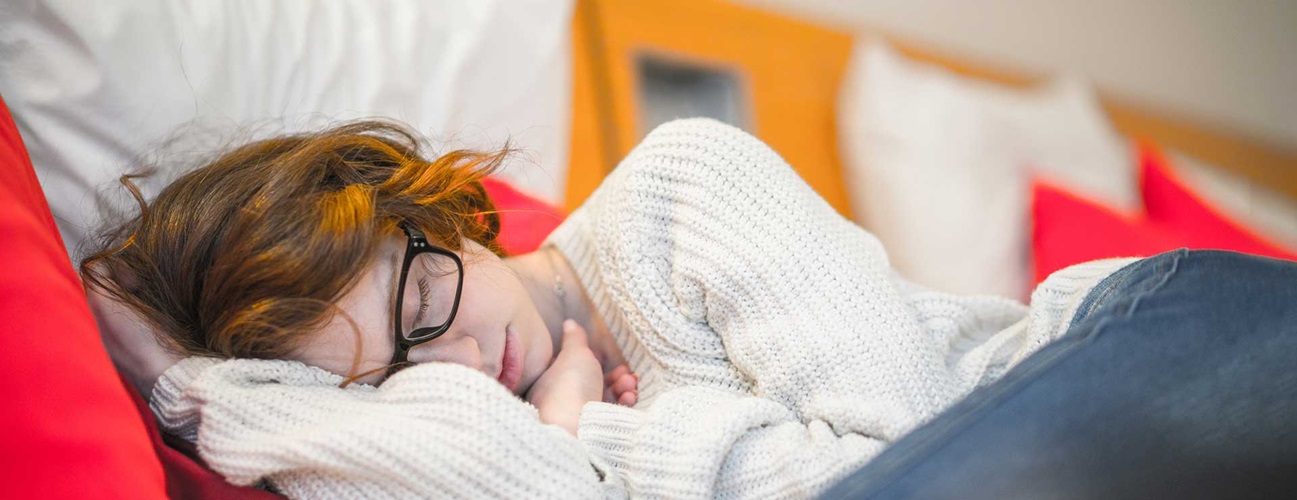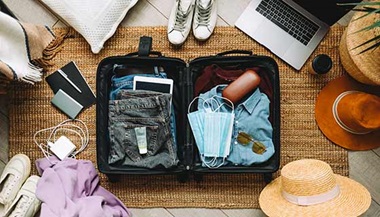Teenagers and Sleep: How Much Sleep Is Enough?
Teens love to label themselves “night owls,” trading stories of all-nighters and sleeping away an entire Saturday. Though teenagers and their sleep habits may be maddening to parents, they’re partly in response to physical changes that occur during puberty. “Teens experience a natural shift in circadian rhythm,” says Johns Hopkins sleep expert Laura Sterni, M.D. This makes it more difficult for them to fall asleep before 11 p.m. Add in early school start times and an increase in homework, extracurricular activities and sometimes a part-time job, and sleep deprivation in teens becomes common. However, says Sterni, it’s important that parents help teens do the best they can, because this age group needs more sleep than we might realize.
Why Teens Need More Sleep Than Younger Kids
So how much sleep is enough? According to Johns Hopkins pediatrician Michael Crocetti, M.D., M.P.H. , teens need 9 to 9½ hours of sleep per night—that’s an hour or so more than they needed at age 10. Why? “Teenagers are going through a second developmental stage of cognitive maturation,” explains Crocetti. Additional sleep supports their developing brain, as well as physical growth spurts. It also helps protect them from serious consequences like depression or drug use (see “The Price of Sleep Deprivation in Teens,” below).
Teenagers and Sleep: Help Them Get What They Need
Sterni and Crocetti both recommend that parents take teenagers and sleep seriously. Begin by modeling good sleep habits, such as adhering to a regular sleep schedule, cutting back on evening caffeine, and exercising regularly. They also suggest these teen-specific and time-tested tips.
Schedule a checkup. Pediatricians can educate teens on how much sleep is enough, recommend healthy sleep habits, and screen them for common teen sleep disorders, including sleep apnea, insomnia and circadian rhythm disorders.
Start the day in sunshine. Having breakfast outside or by a sunny window helps regulate the body’s biological clock, making it easier for teens to wake up in the morning and drift off at night.
Encourage the connection. When your teen is well-rested, ask how he felt that day while taking a test or playing a sport. Help him come to the conclusion that sleep improves his outlook—and help him realize how much sleep is enough.
Tie good sleep to car privileges. Sleep deprivation in teens can lead to accidents. “I tell my teenage son he can’t drive to school in the morning if he’s not getting enough sleep,” says Crocetti.
Help teens rethink their schedule. If your teen typically starts homework after evening activities, help him find an earlier time to get started. Ultra-busy schedules may require paring down.
Encourage afternoon naps. Tired teens may benefit from a 30- to 45-minute nap before dinner. This is a better fix for sleep deprivation in teens than sleeping-in, which throws off their body’s sleep cycle.
Ban tech from the bedroom. Using tech at night not only cuts into teens’ sleep time, it also exposes them to a type of light that suppresses the body’s production of the sleep-inducing hormone melatonin, making it tougher to fall asleep.
Encourage schools to move toward later start times. Many middle and high schools are exploring the idea of starting school around 8:30 a.m.—the time recommended by the American Academy of Pediatrics. Talk with your local school board about this issue.
Watch the summer shift. It’s normal for teenagers to want to shift their sleep schedule during the summer. Just make sure they don’t push bedtime too far past the one they had during the school year, advises Sterni. Teens whose schedules shift significantly may find it more difficult to return to an appropriate school sleep schedule and experience problems such as moodiness and excessive daytime sleepiness at the start of the school year. Those with significant shifts in their sleep schedule may need to see a sleep specialist to get back on track in September.






